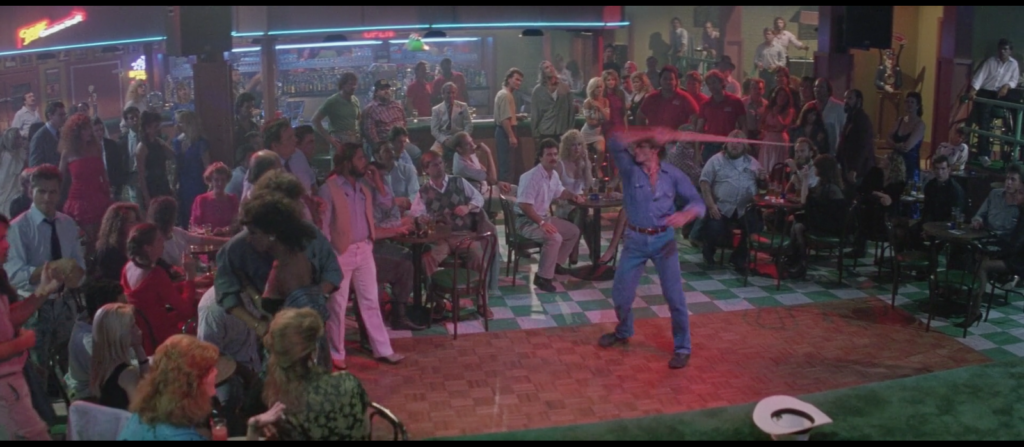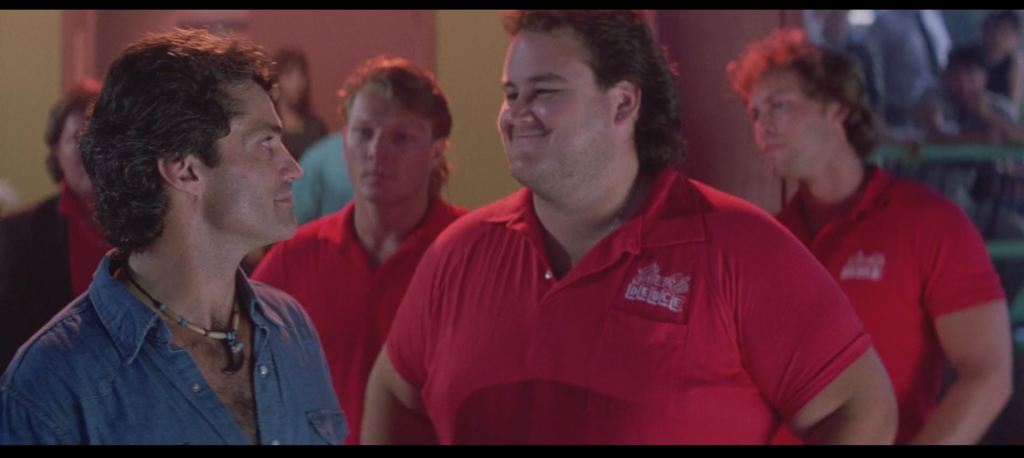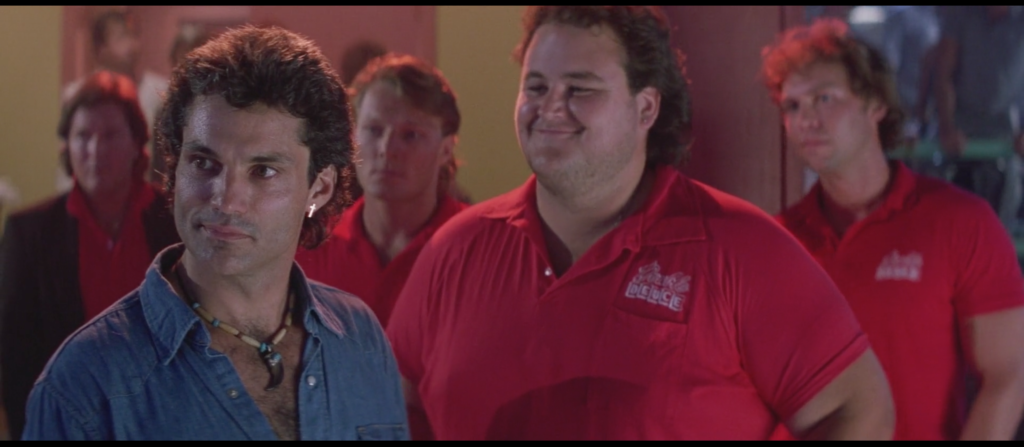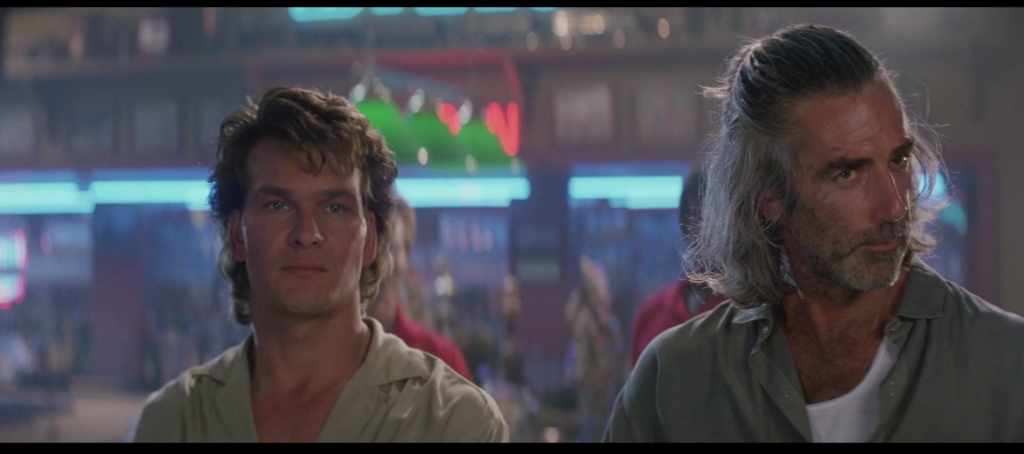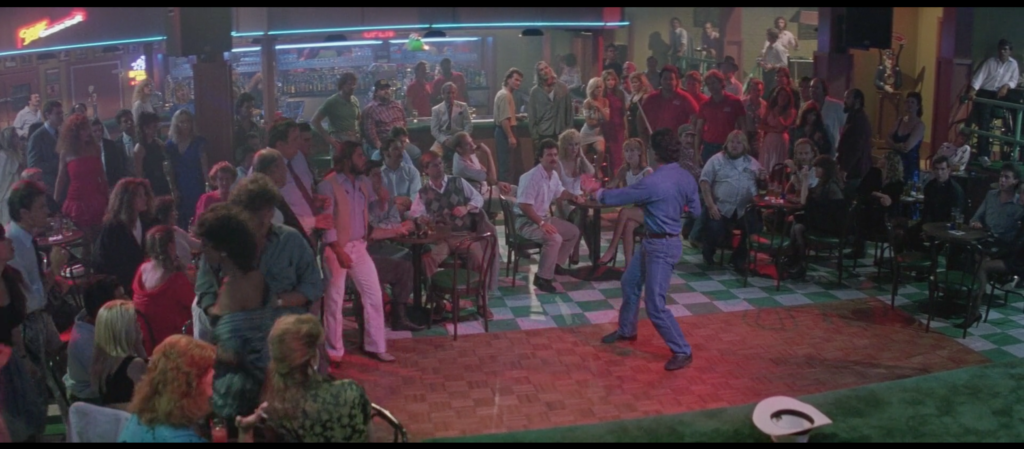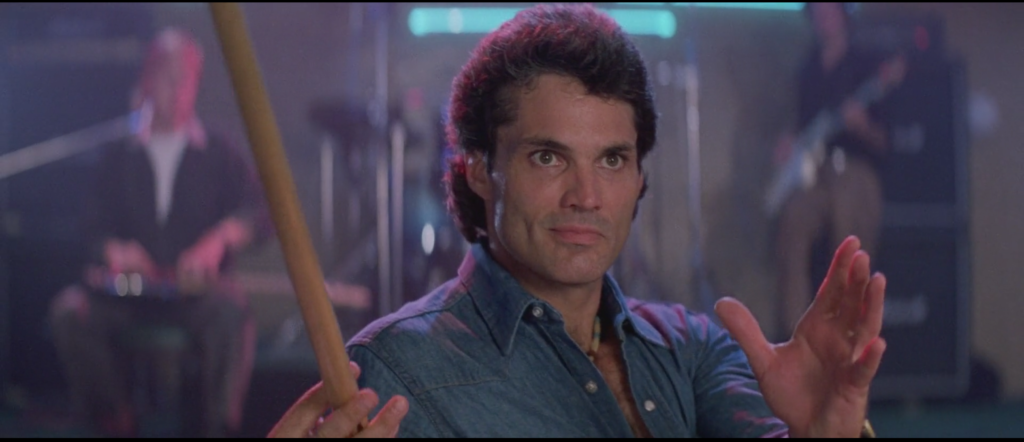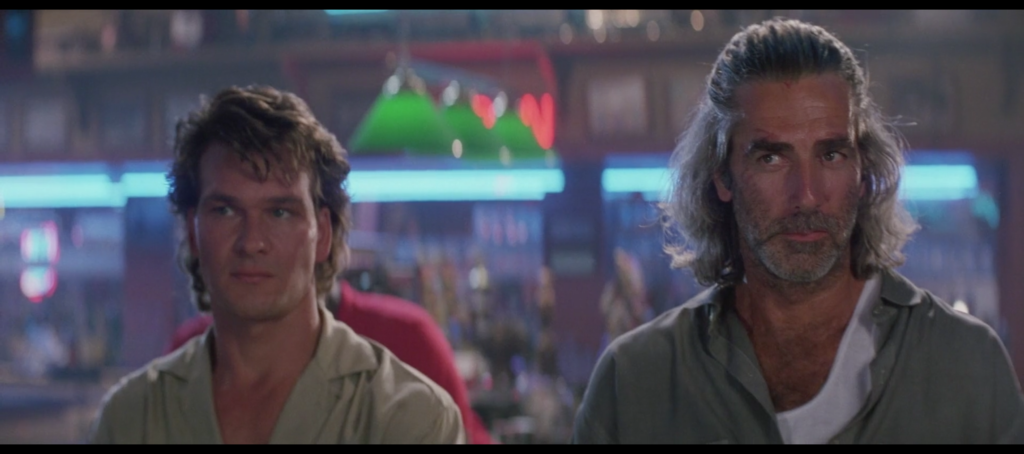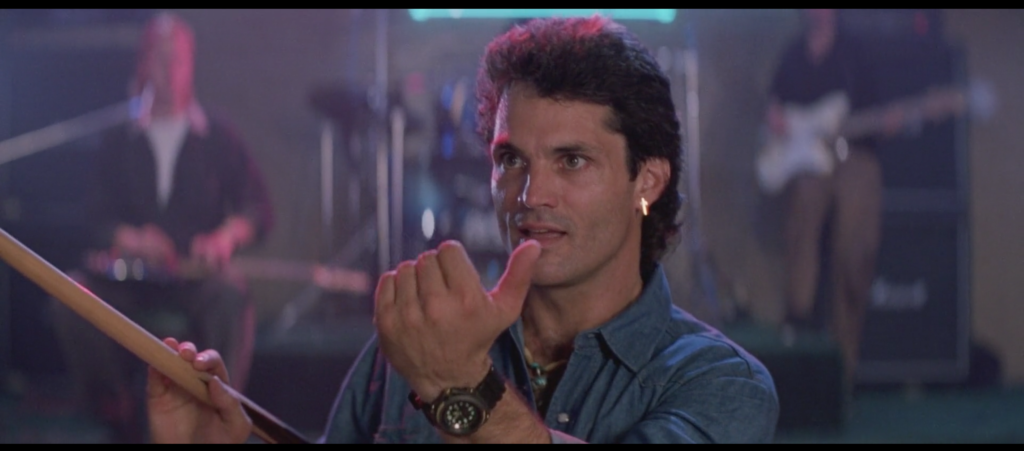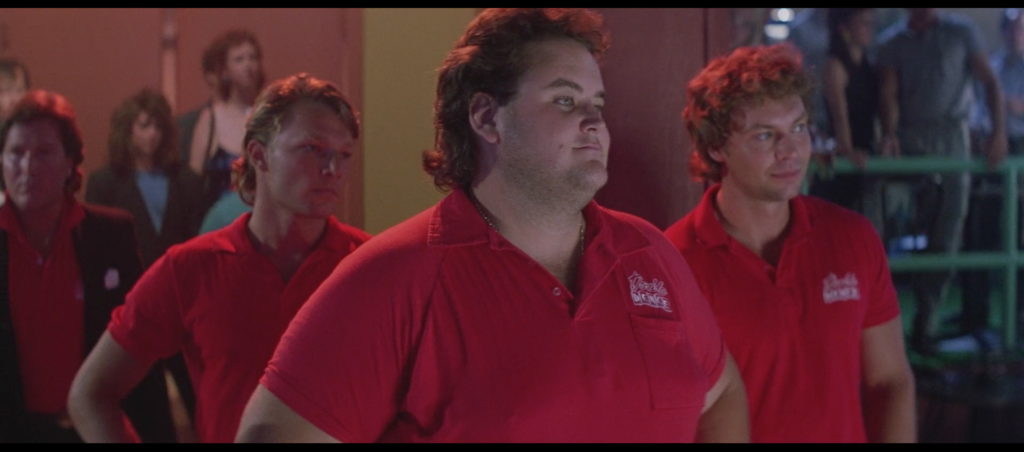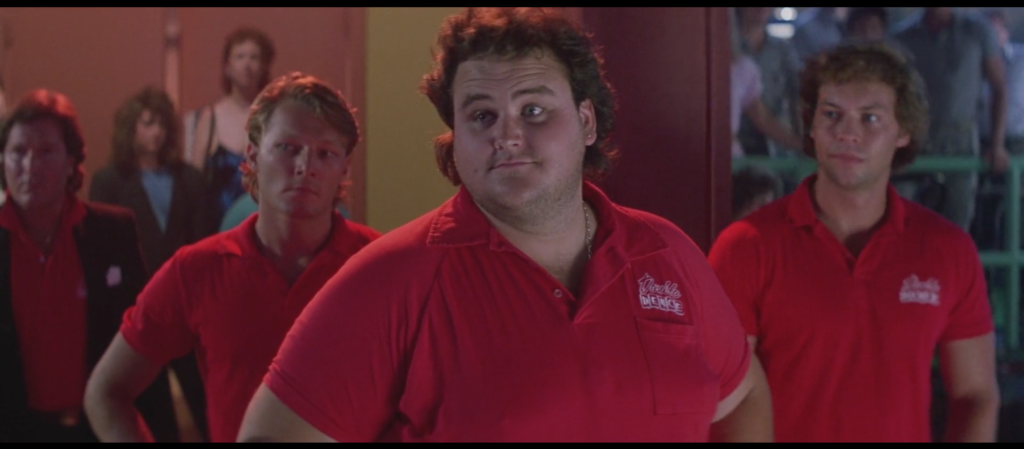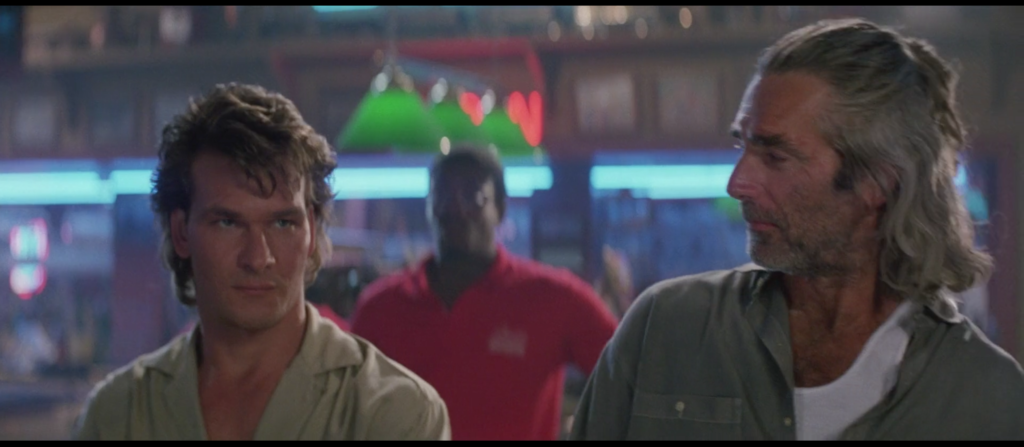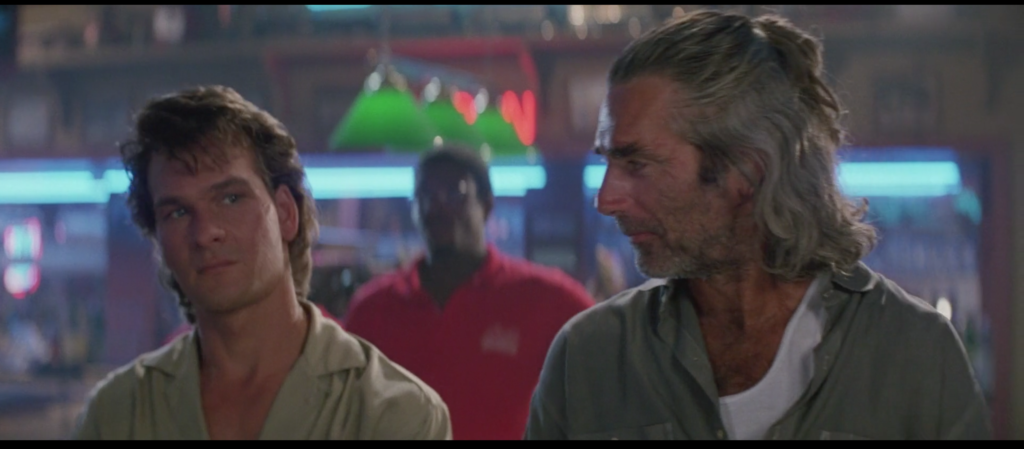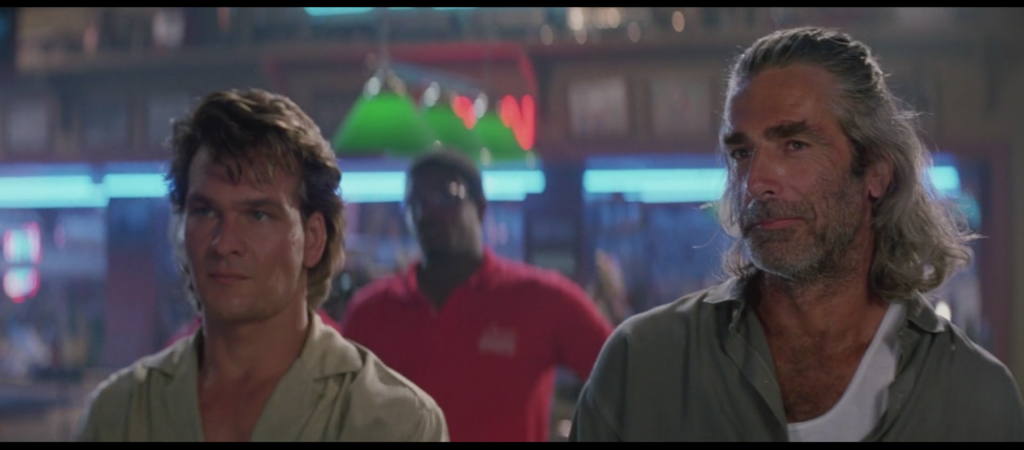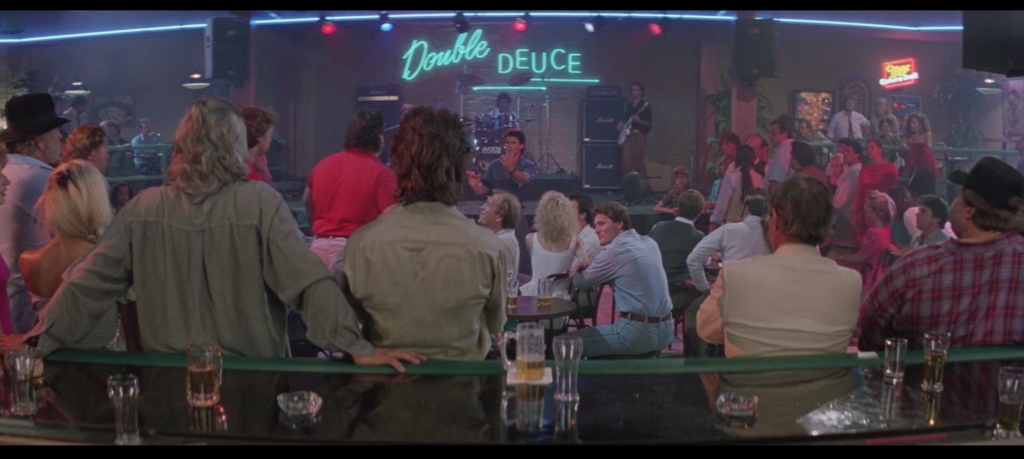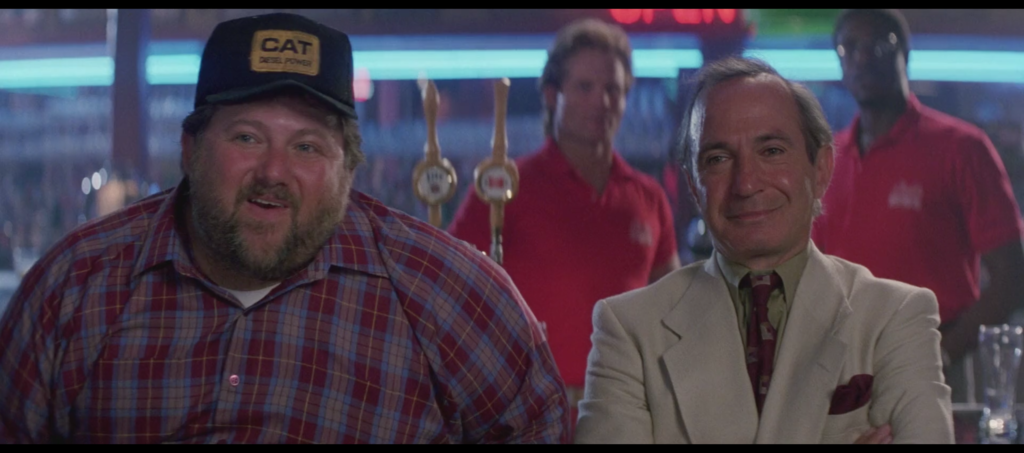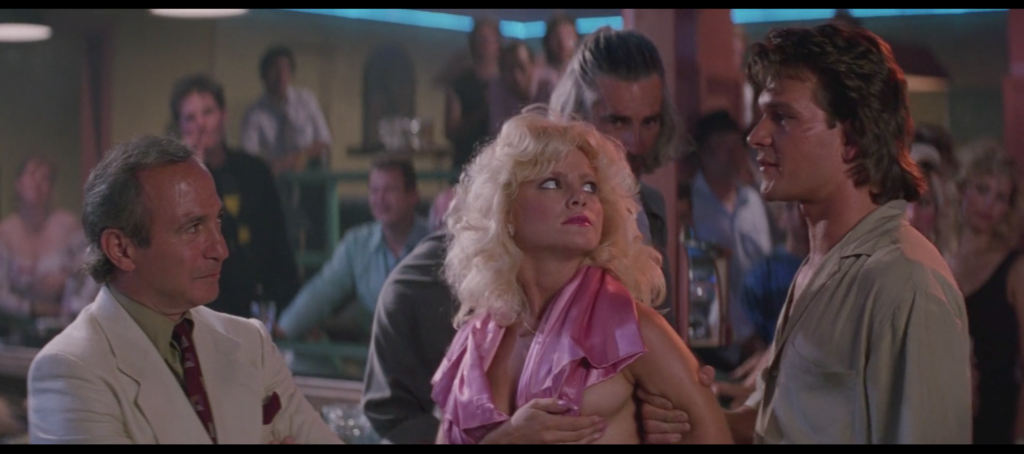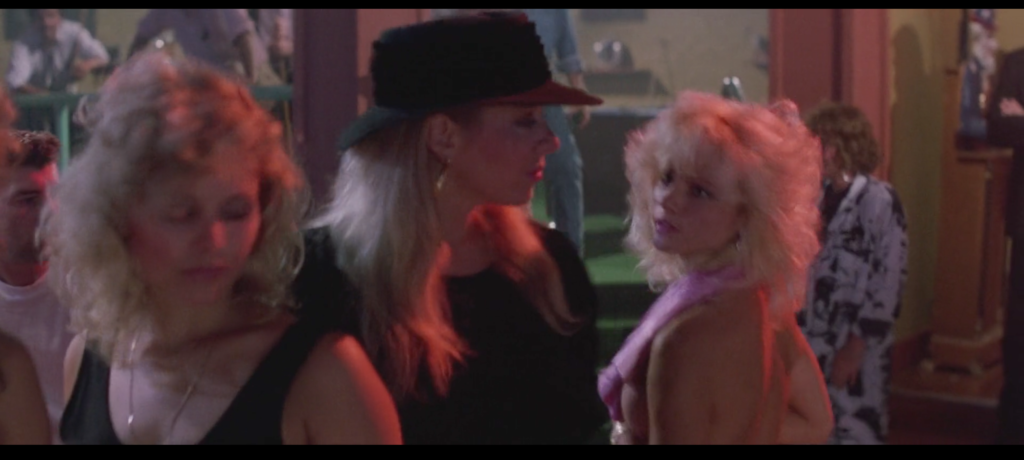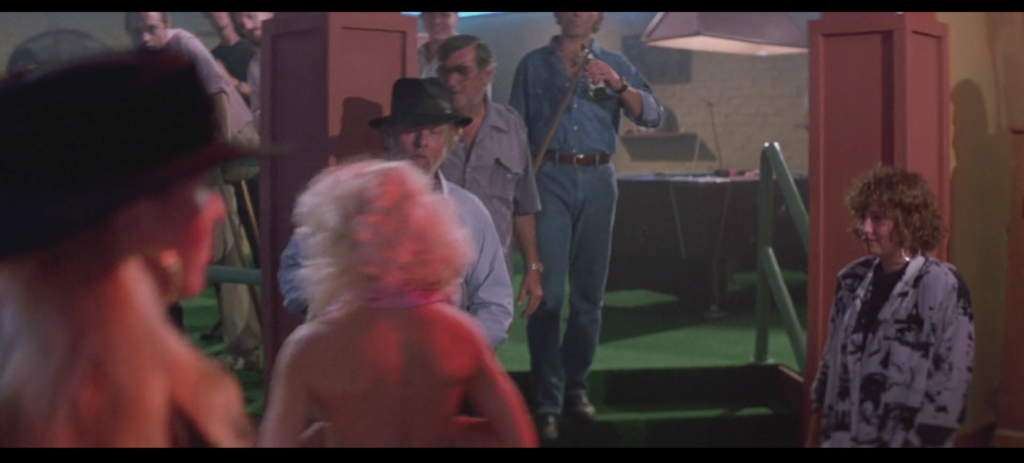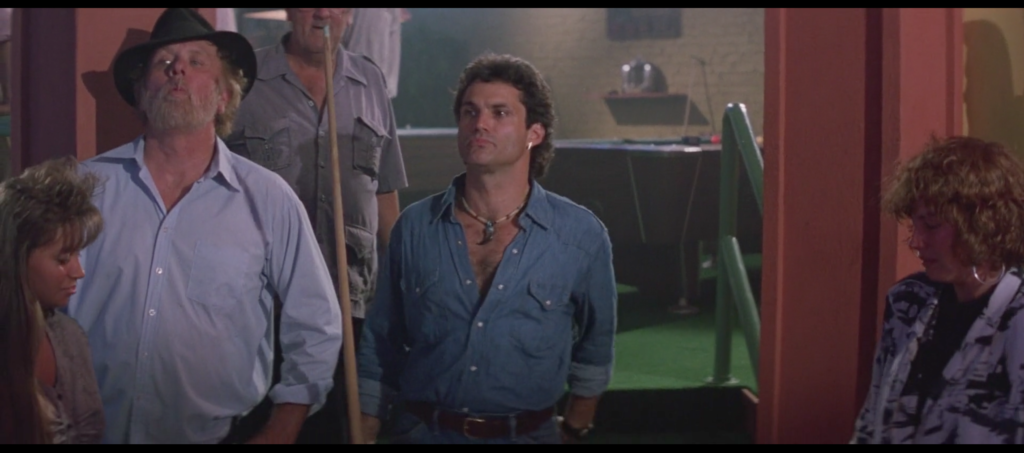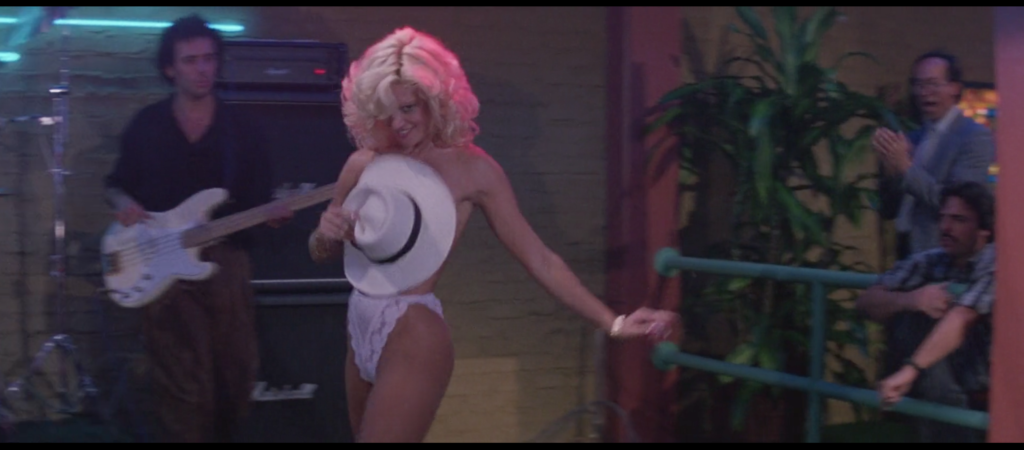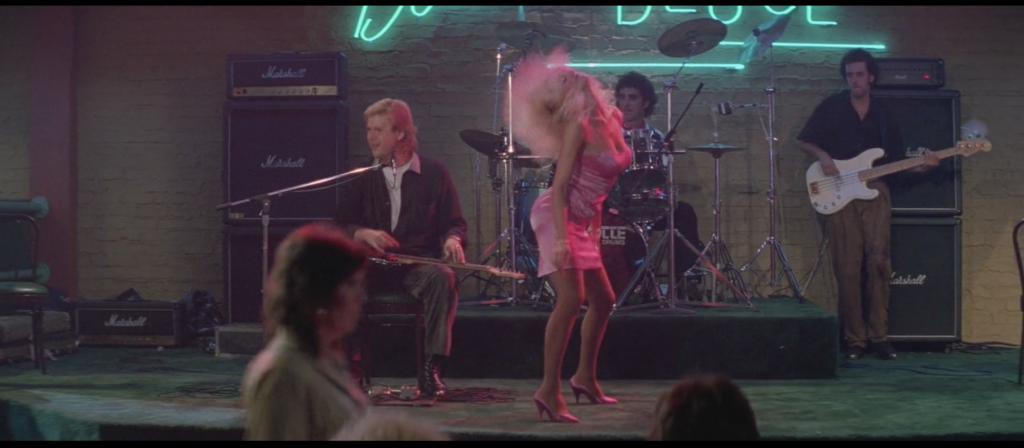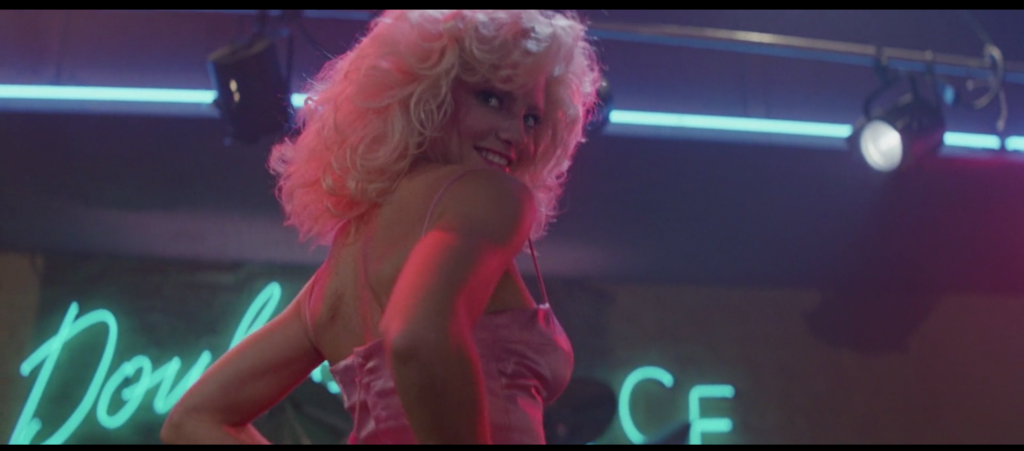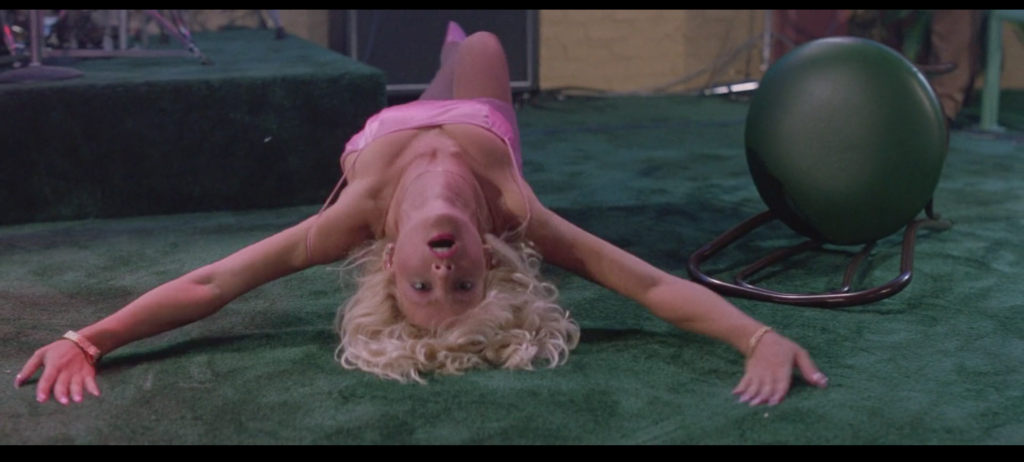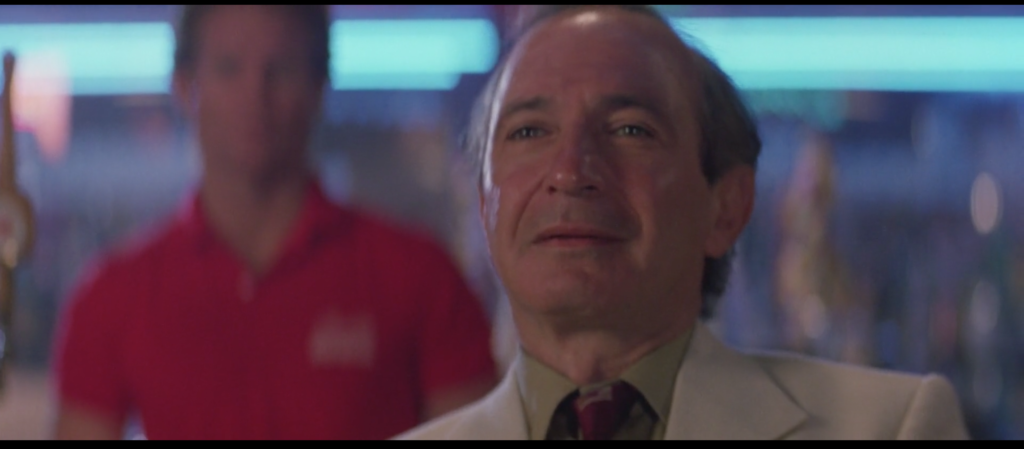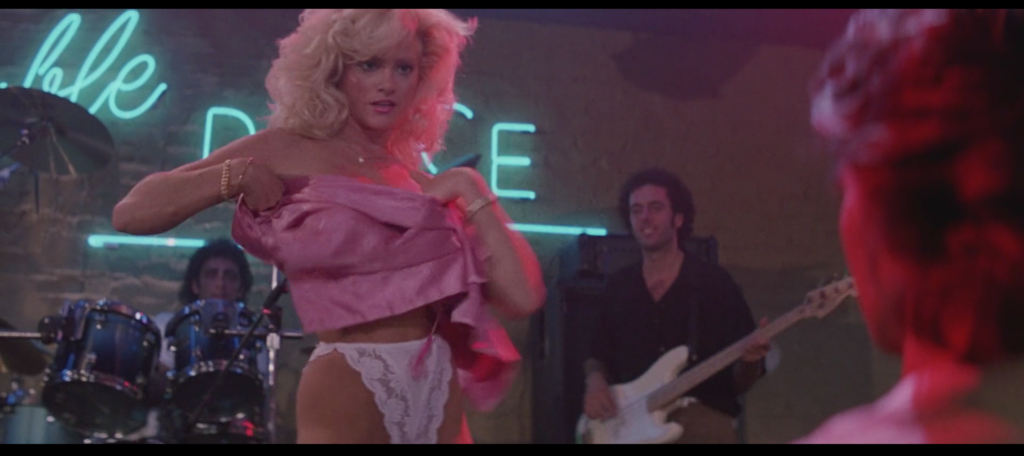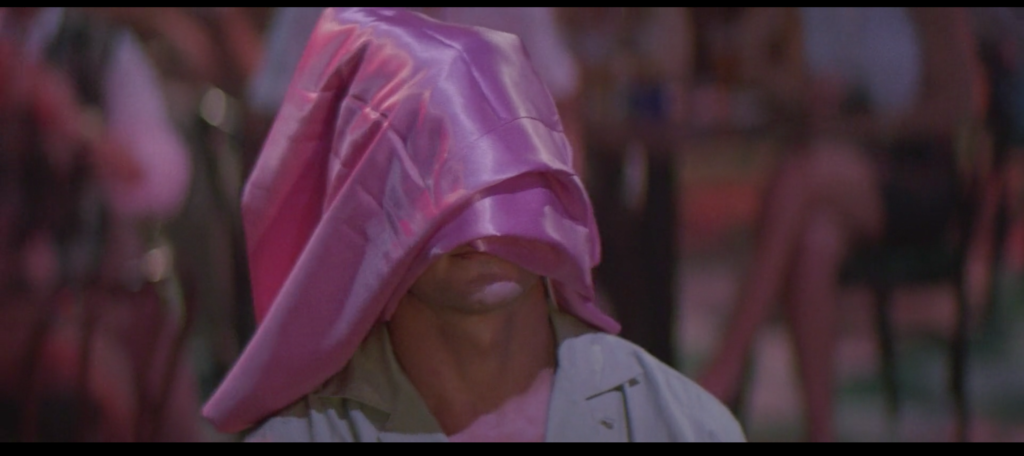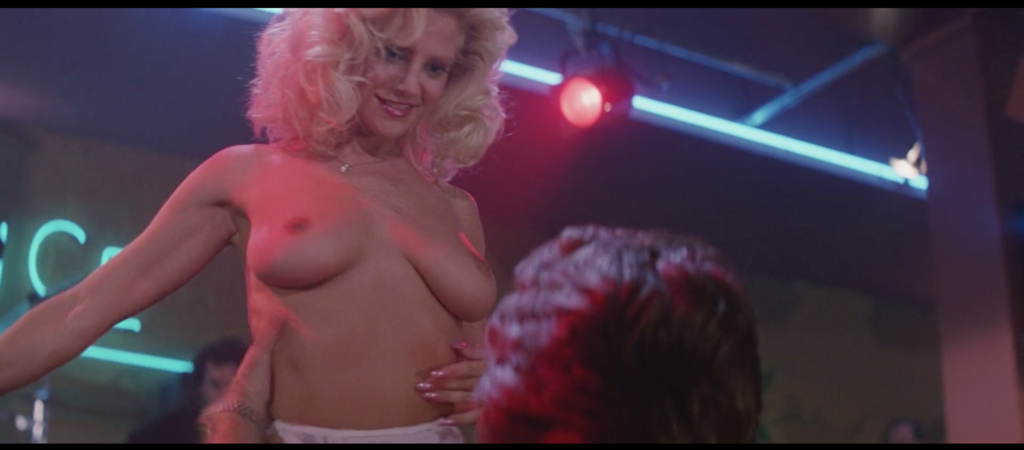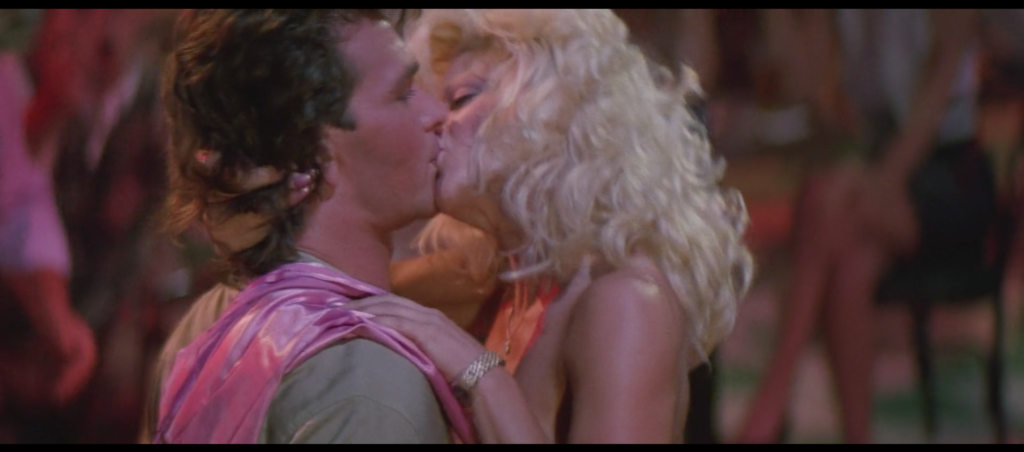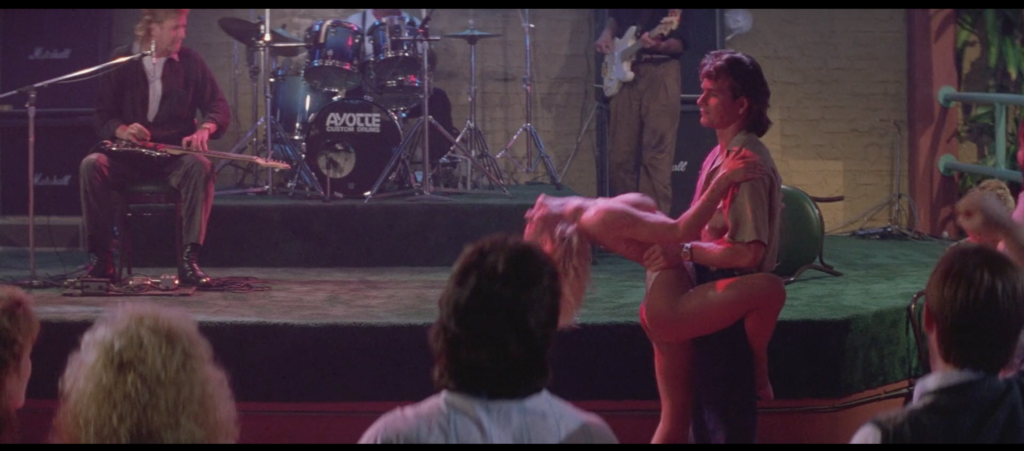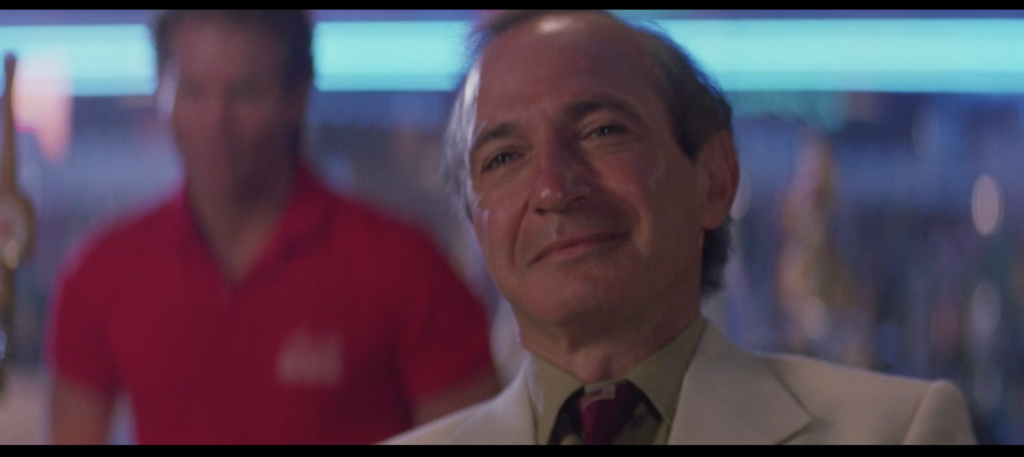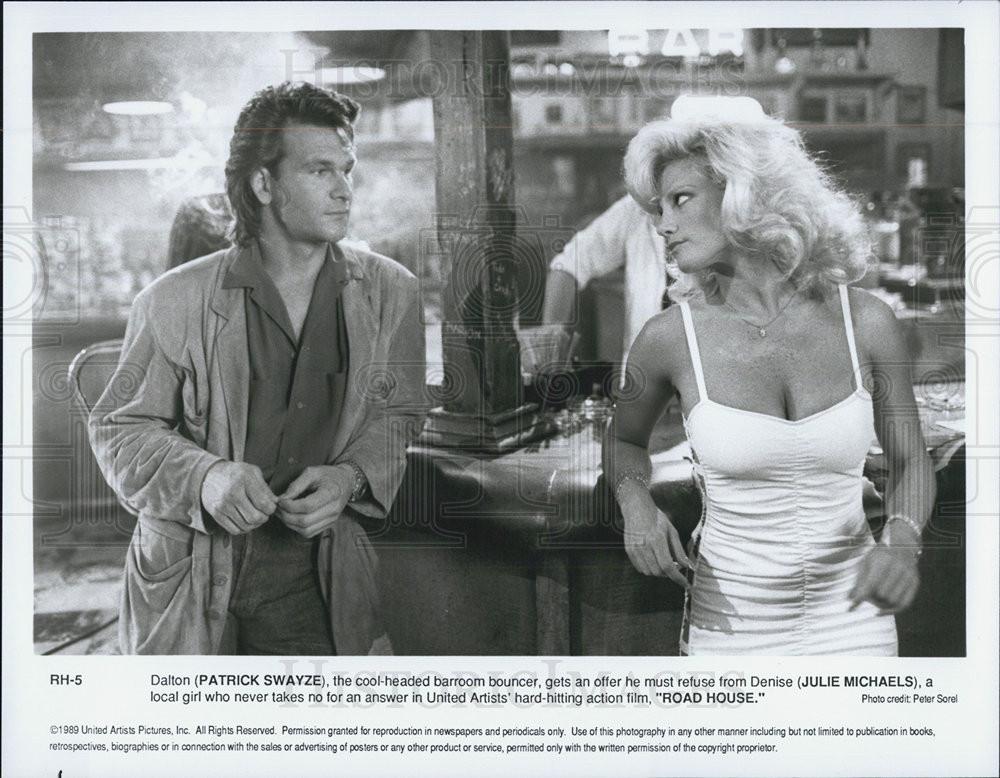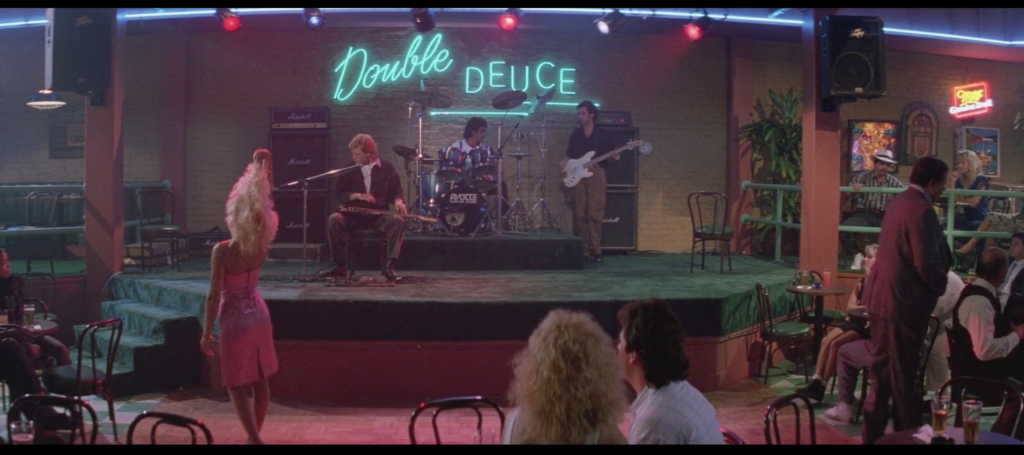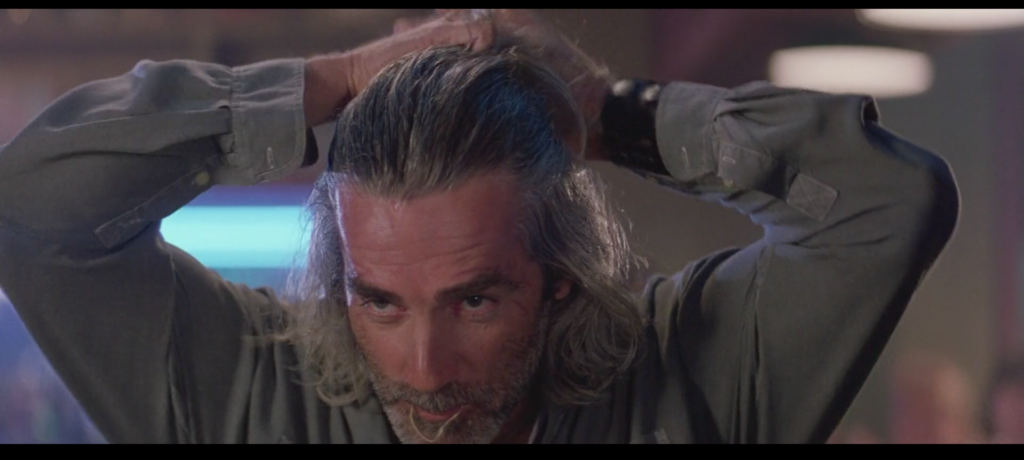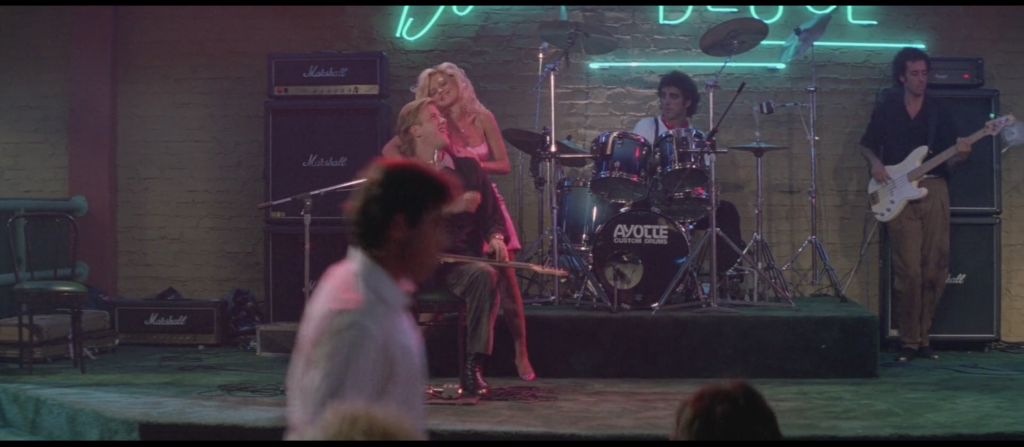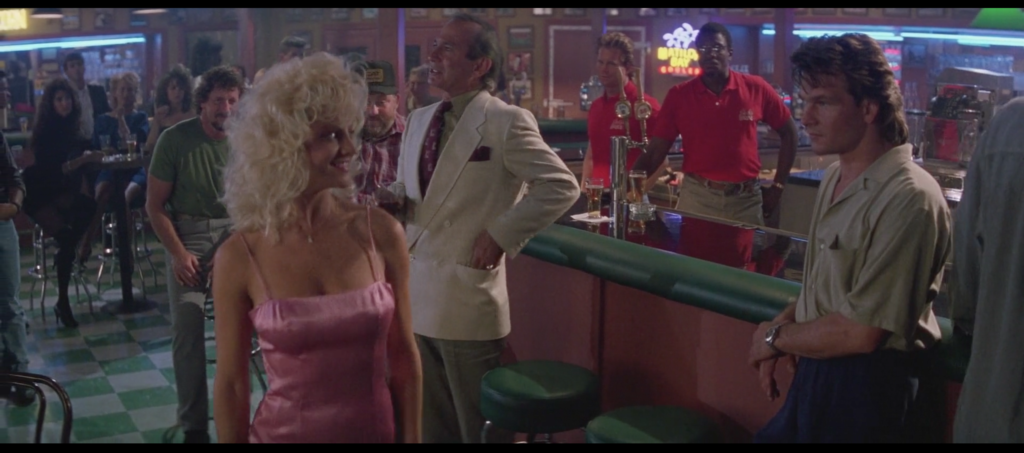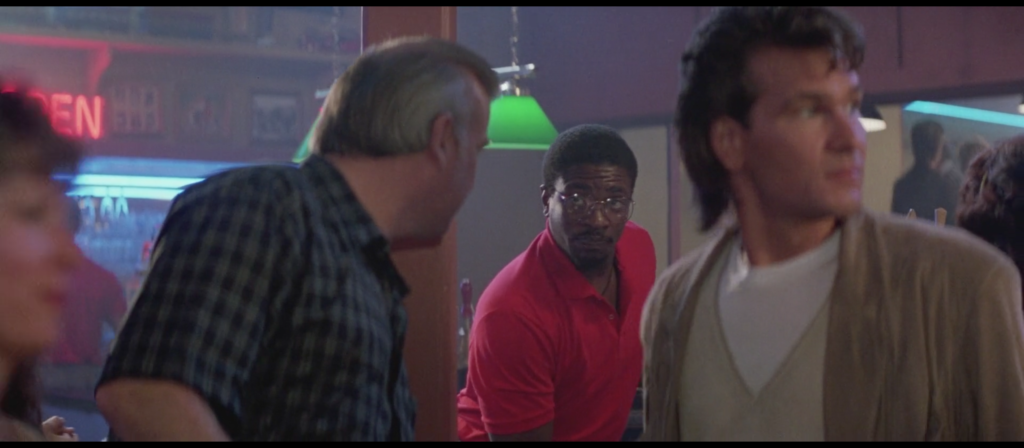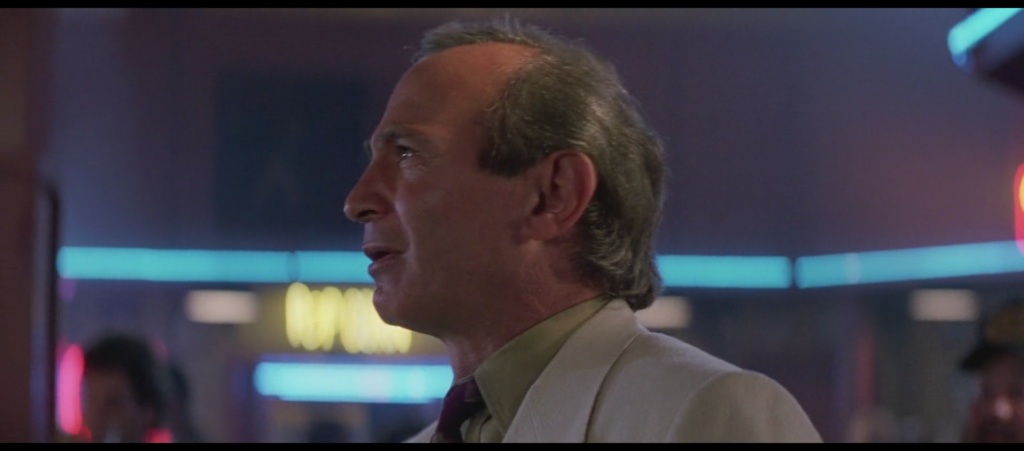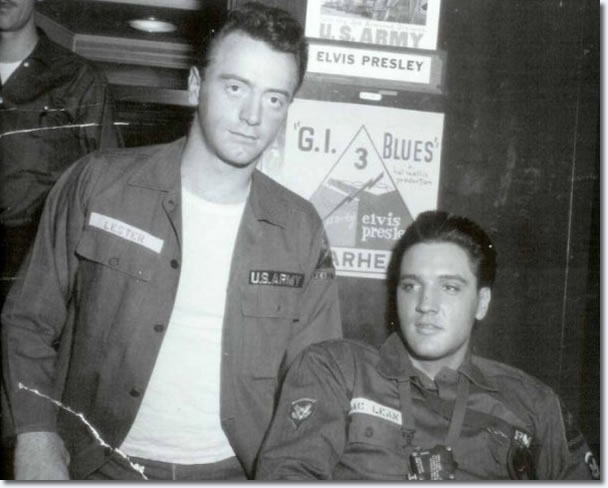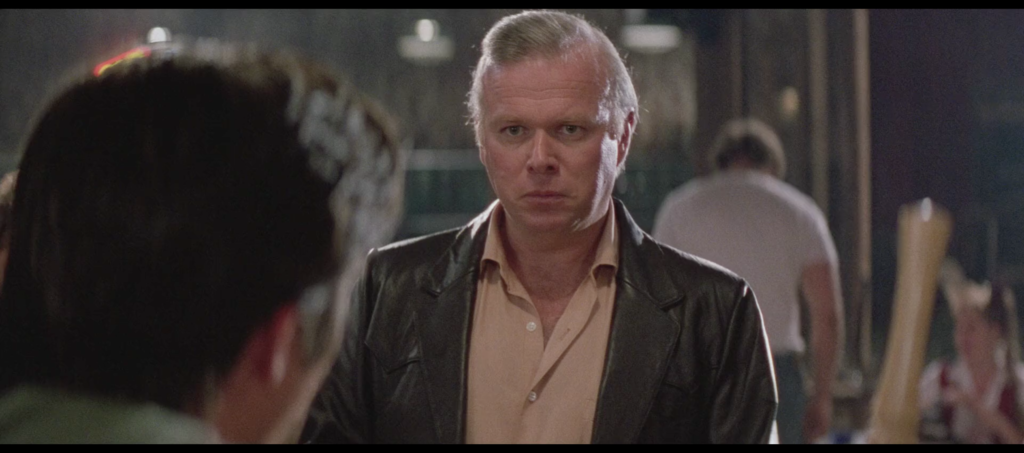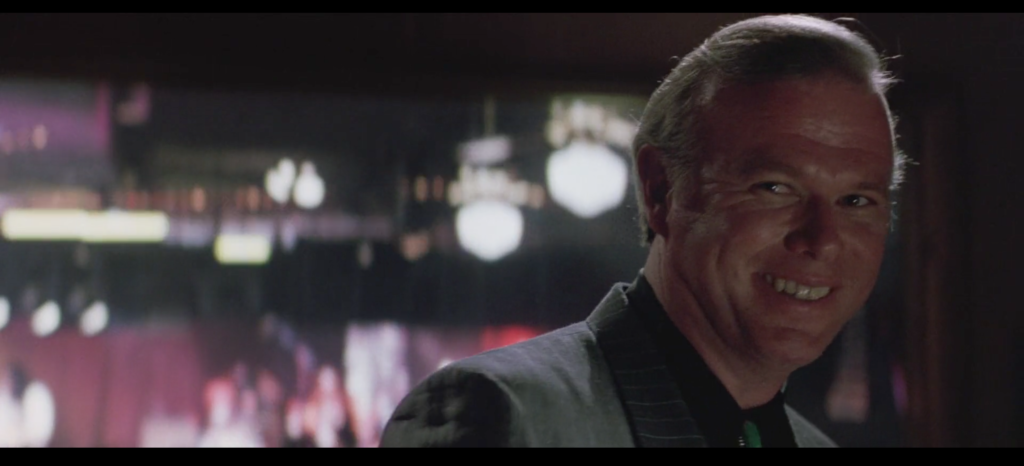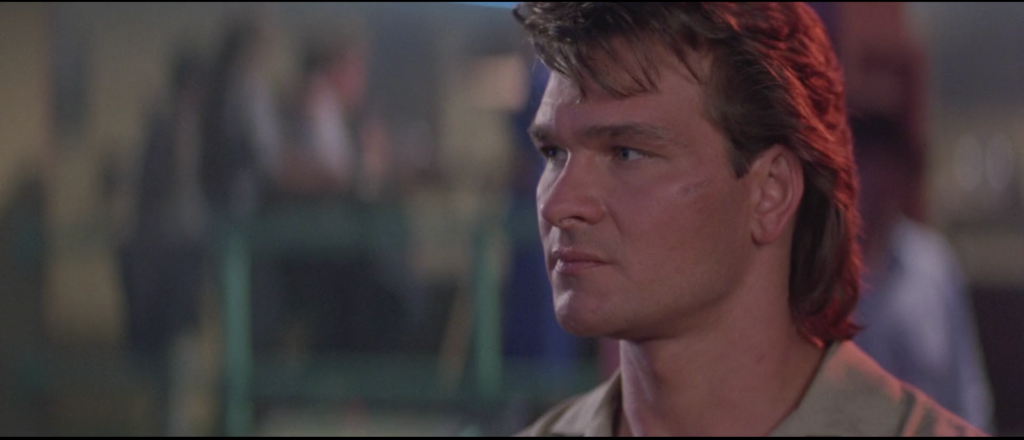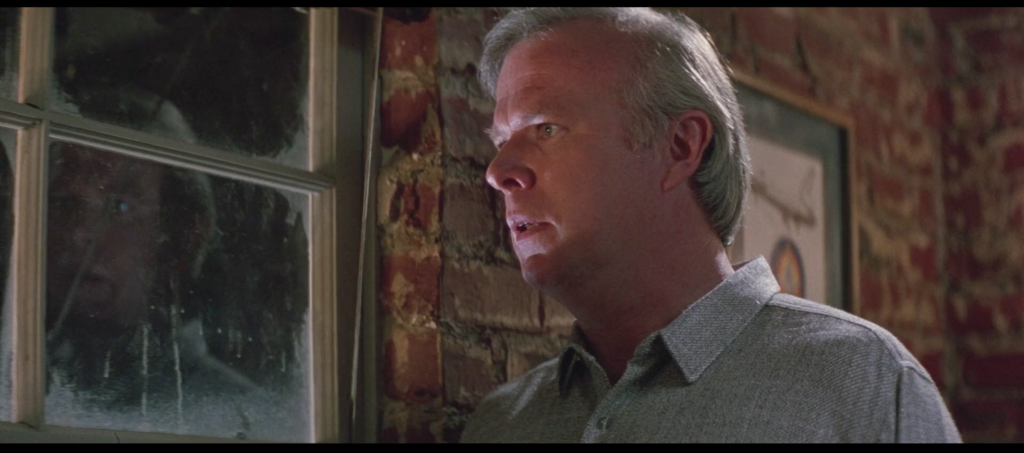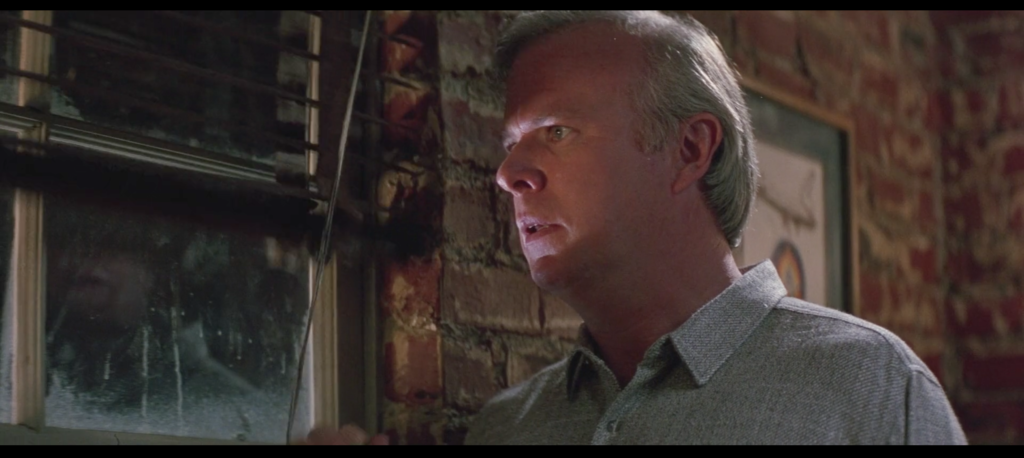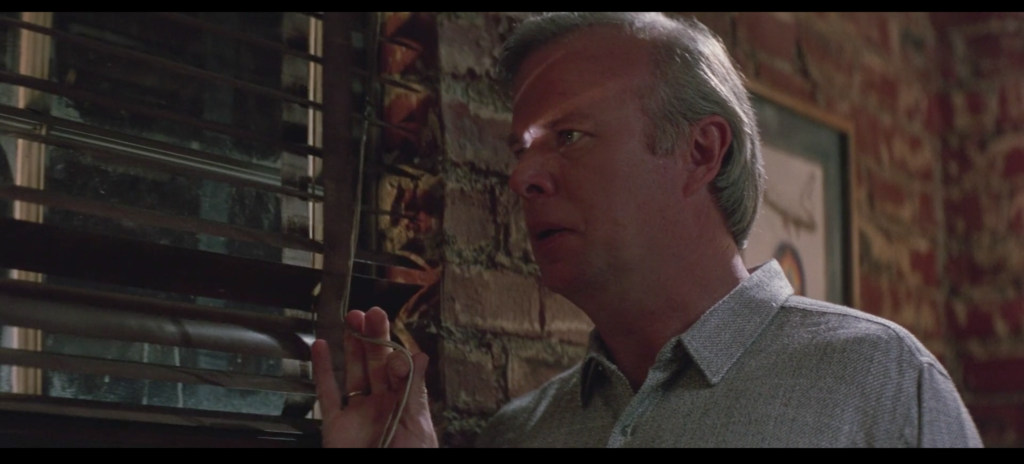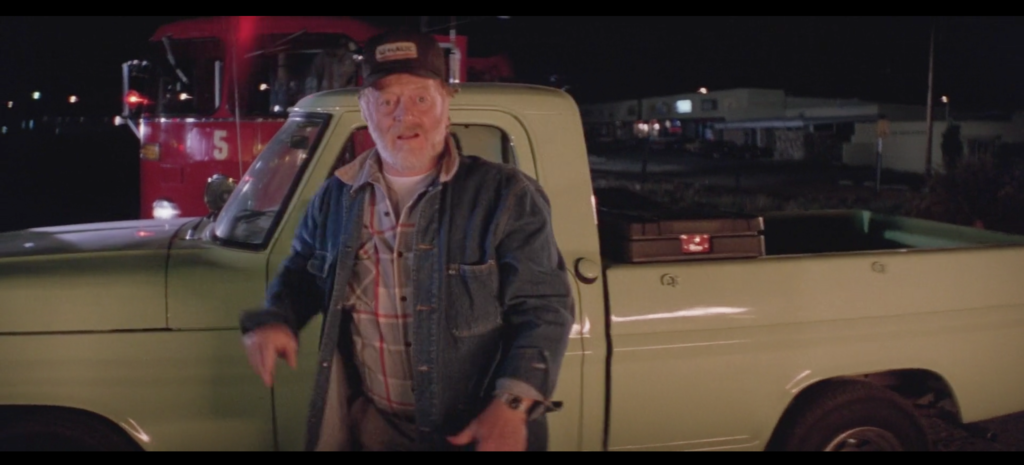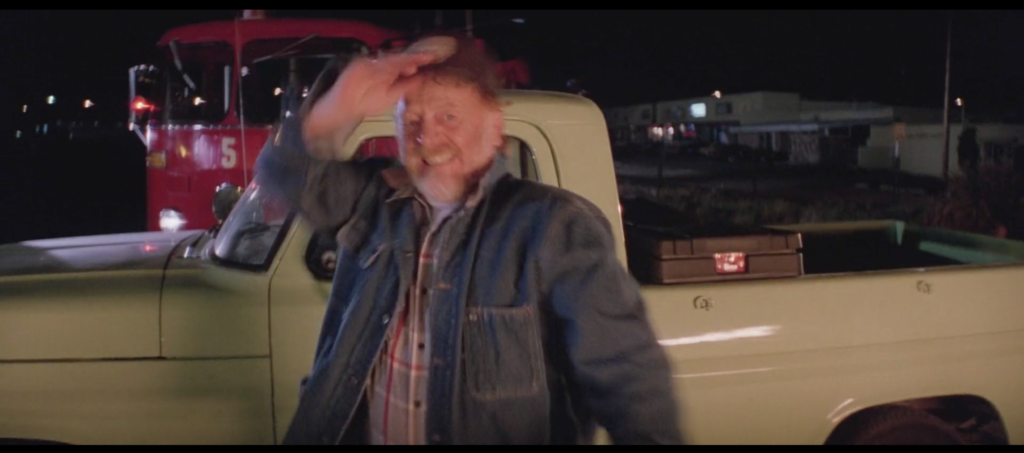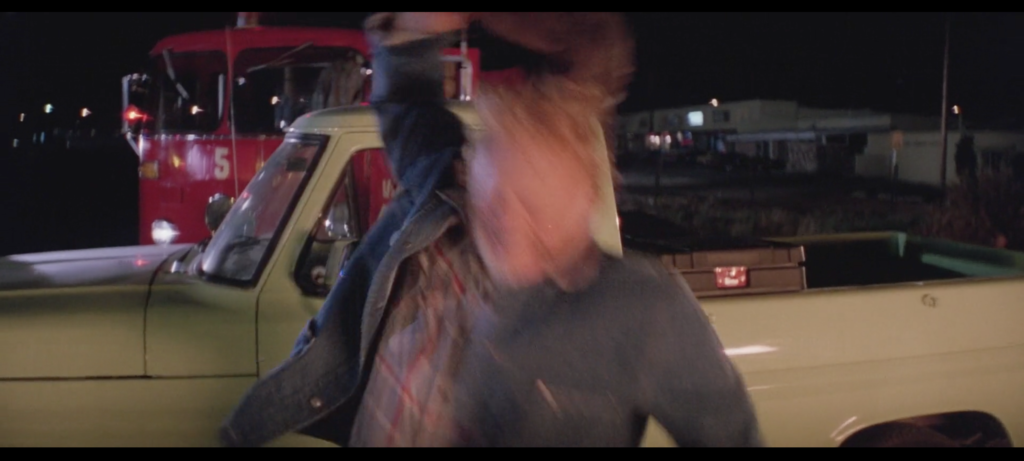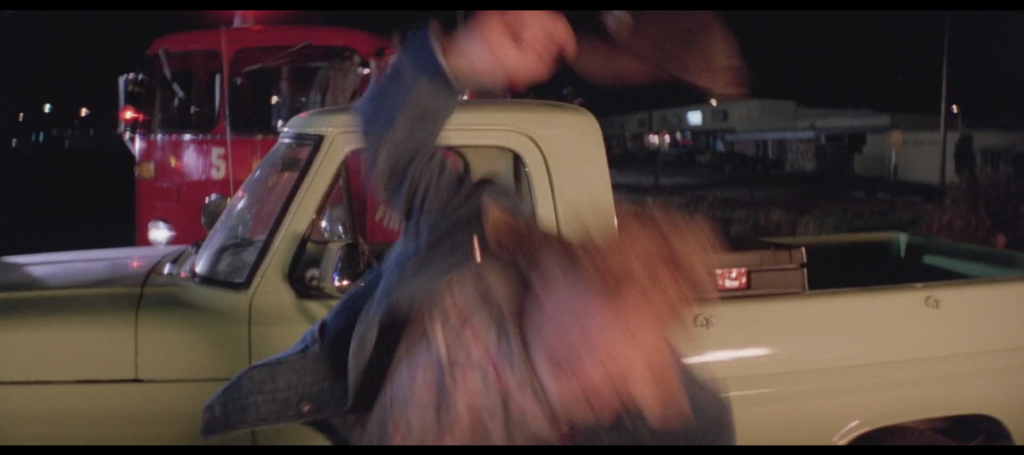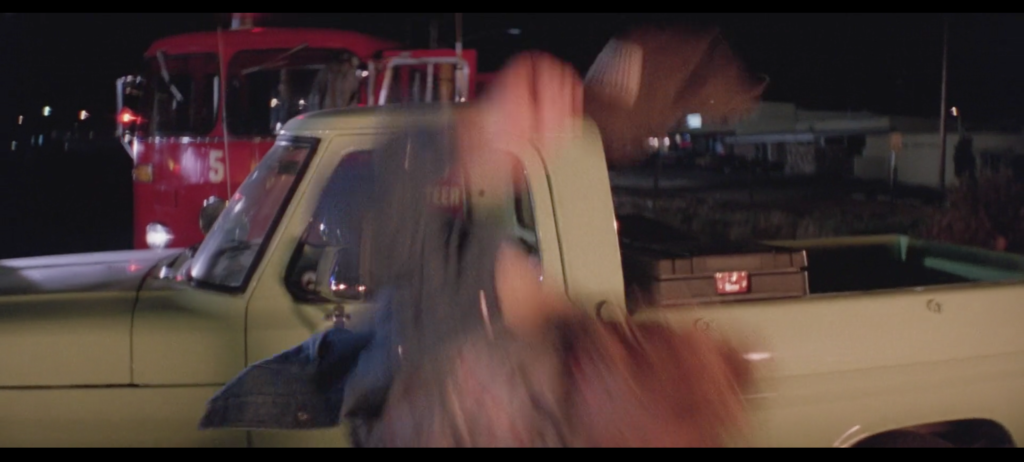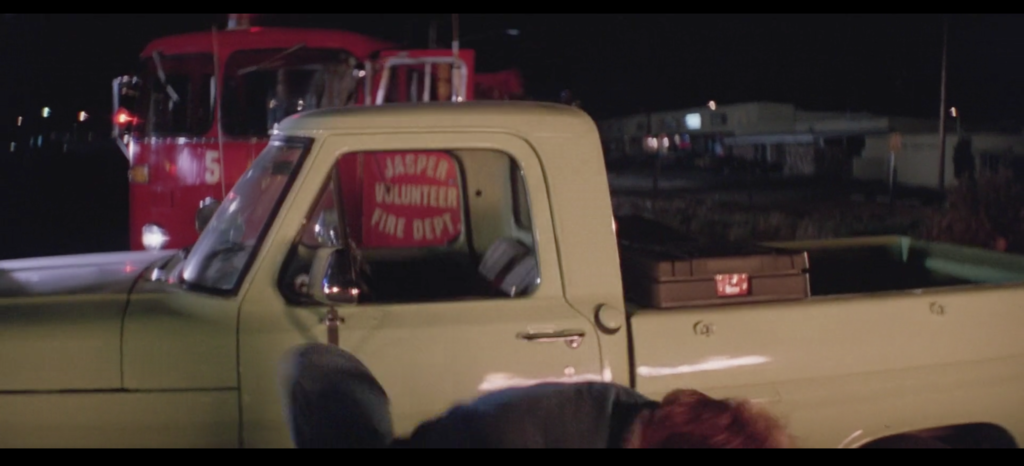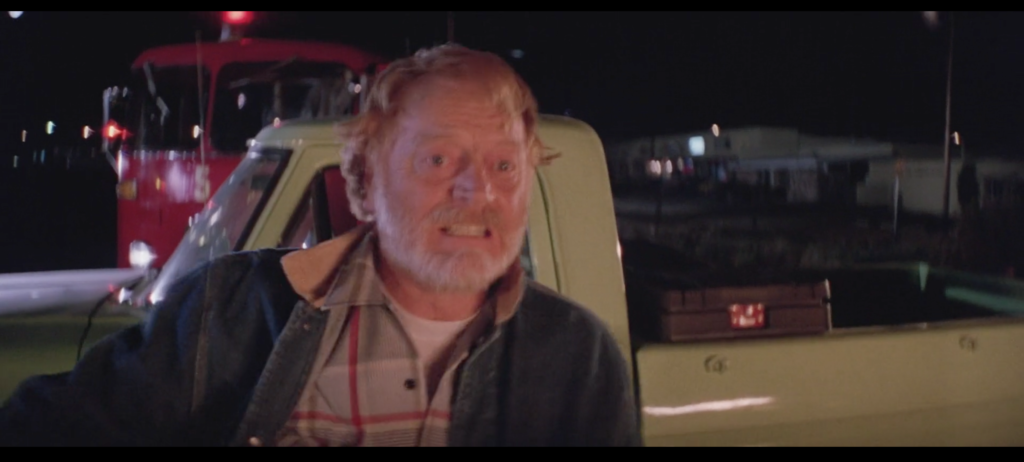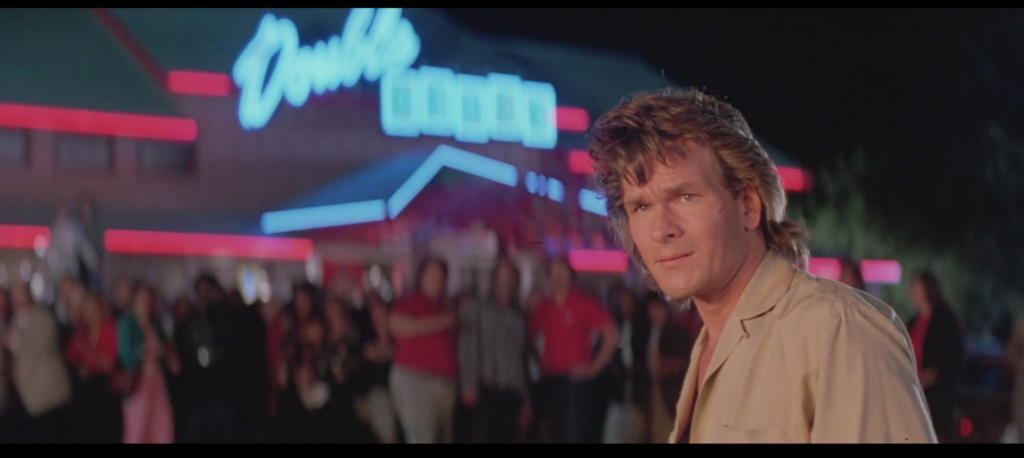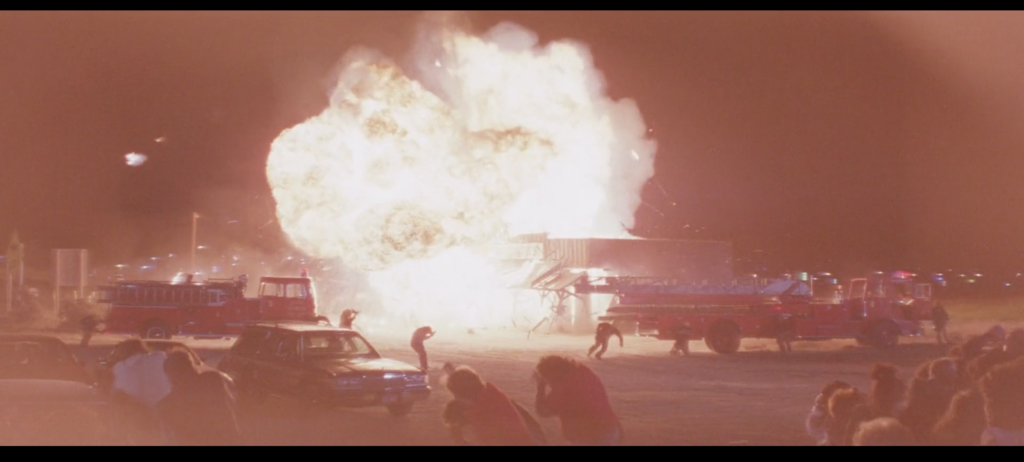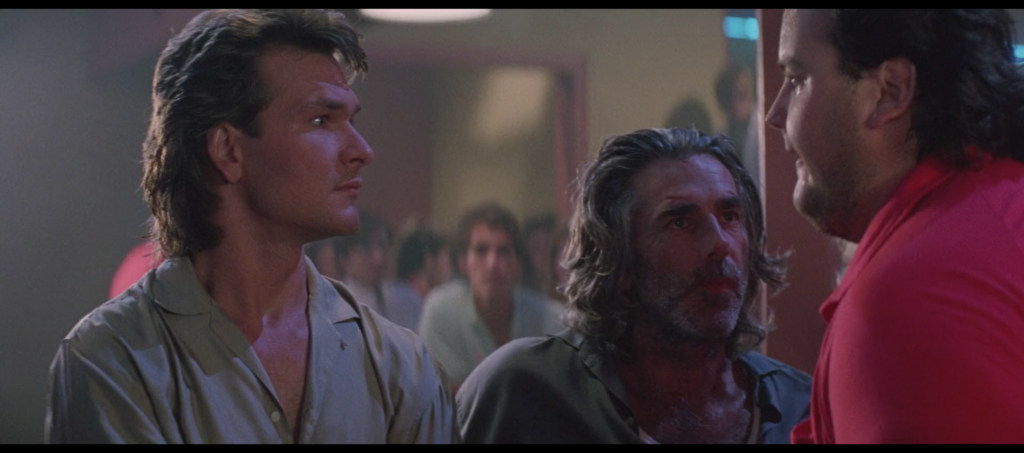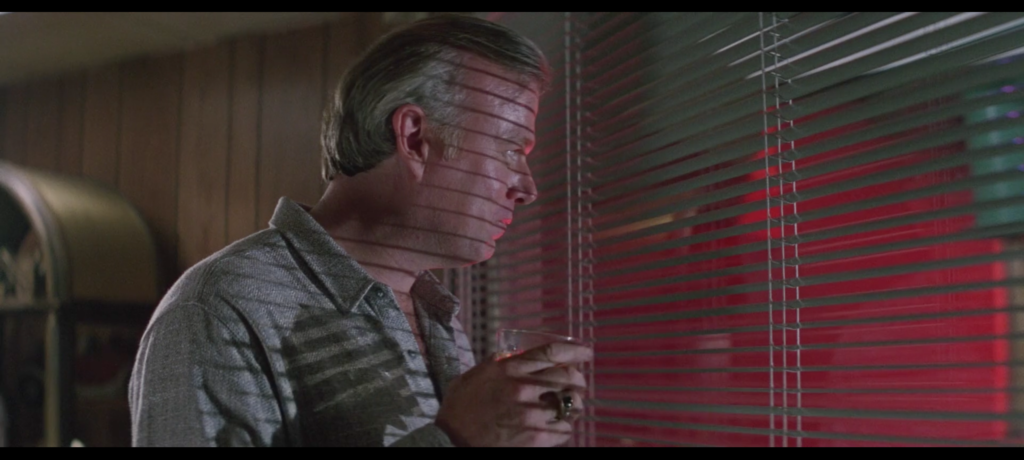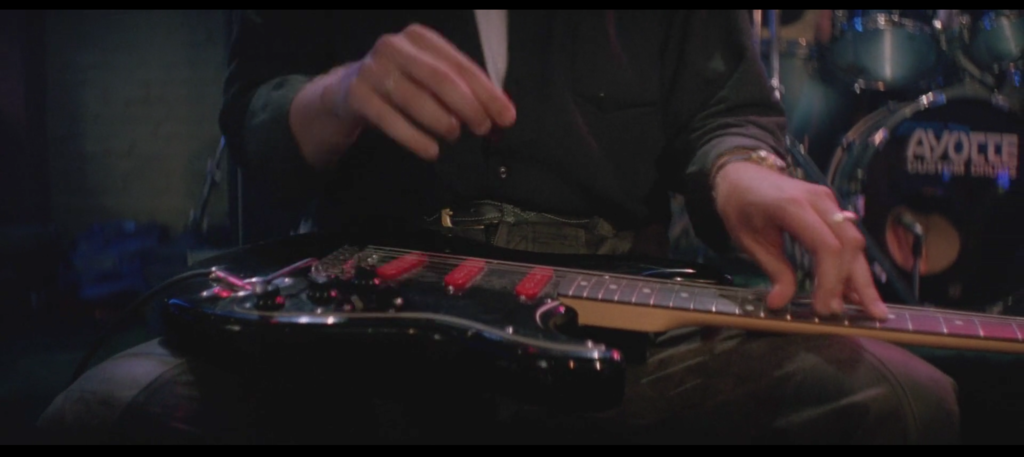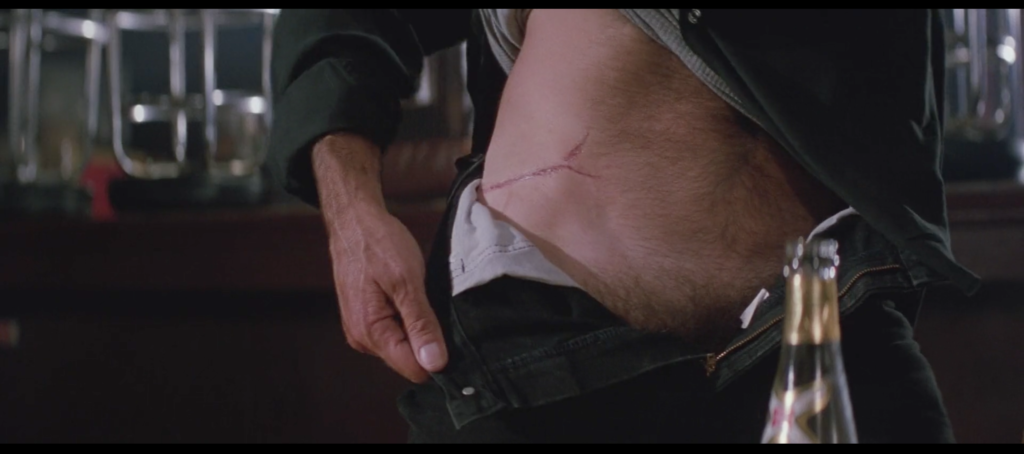Posts Tagged ‘road house’
256. The Childlike Jimmy
September 13, 2019When Jimmy finally enters the fray, after three quarters of the film have elapsed, he does so wielding a pool cue. In this he is living the dream of every child who ever grabbed a hockey stick or whiffle ball bat or cardboard wrapping-paper tube and fancied themself a swordfighter, a Jedi, a Robin Hood, a Zorro, a Knight of the Round Table. He’s playing a game with violence.
Of all Brad Wesley’s “boys,” to use his preferred term, Jimmy is his clear favorite. It has been the position of this series that this stands to reason, because Jimmy is Brad Wesley’s bastard son. Once estranged, they are now thick as thieves. The older man, I suspect, yearns less to make up for lost time than to, in his words, “gather unto me what is mine.” A Brad Wesley who discovers his by-blow is a Brad Wesley who instantly dedicates himself to Brad Wesleyifing that product of his loins—who will see himself in all his offspring’s most valued qualities.
But by the same token, Jimmy would look to be the son Brad Wesley never knew he had. That means obedience. That means mimicry—the same sly smile, the same eyes sparkling with malignant good cheer. And that means, on some level, behaving as a child would behave. Yes, Jimmy is about to cut through Dalton’s men like knife cutting through cake. But he’ll do so with a toy in his hand.
255. Faces
September 12, 2019254. “If you’re gonna have a pet, keep it on a leash”
September 11, 2019If you’ve read all 253 Pain Don’t Hurt entries to date you’ll agree I’m no fan of Dalton’s response to Denise’s striptease. His condescension, if not outright cruelty, to a sex worker and abuse survivor is unconscionable given his philosophical mandate to be nice until it’s time to not be nice. Is this, is the removal of Denise from the stage and the presentation of Denise to her abuser, really such a time?
All I can say in Dalton’s defense is that this is a rare case of seeing the forest but neglecting the trees. The destruction of Red Webster’s Auto Parts marks a major escalation of hostilities in the war between Dalton and Brad Wesley. That would make this time to not be nice, barring any further considerations; Dalton fails to realize that Denise and her plight are such further considerations. Moreover, the aforementioned war has been waged entirely, on Wesley’s side, by third parties, namely his goons. Dalton correctly locates Denise’s dance in the context of Wesleyan aggression, however weird that aggression might be in this case; he treats her as he might treat a goon, albeit one against which he does not want to raise his hand, missing the obvious distinctions between Denise and the Tinkers and O’Connors of the world.
It should be noted here that at one point Dalton cracks a wry smile at Denise when she’s beaming at him from the stage, but while that smile might be seen to indicate warmth towards her, it’s not at all dissimilar from the grins he occasionally flashes at the likes of Ketcham or Pat McGurn when they start to get up in his business. To Dalton, a goon is a goon is a goon.
But if he is guilty of making this categorical error, he is by no means alone. “If you’re gonna have a pet,” he tells Wesley while gripping Denise roughly by the arm, “keep it on a leash.”
Denise yanks her arm away.
“You’re right,” Wesley says, conceding the point.
Then—as if summoning a pet—he calls this man’s name.
253. Hats Off Revisited
September 10, 2019The patrons of the Double Deuce love their hats, yes they do. But perhaps no one loves their hat quite so much as the mustachioed gentlemen in the striped short-sleeved shirt visible on the right, as it transitions from headwear to a stylish blouse in the hands of Denise. To her I can only say kudos for this innovative application of Road House‘s most ostentatious and inexplicable fashion accessory.
The interesting thing here, though, is that this is not one of the black hats visible earlier in the film, but a white one. White hats are the symbol of moral rectitude in the Western, the genre to which Road House is most directly indebted. Here, Denise toys with the white hat before dispensing with it altogether. It’s her way of thumbing her nose at the good guys and their rules and their holier-than-thou attitudes. It does the heart good to see her thus empowered. Given Dalton’s behavior a few seconds from now, she deserves this all too brief allowance.
252. Bump and grind
September 9, 2019The images above are but a sampling of the striptease Denise performs for…who, exactly? The target is clearly Dalton, with whom she barely ever breaks eye contact, against whose lips she passionately presses her own while wrapping him in a sensual embrace. Knowing, as we do from the scene in which she propositioned him, that she is sexually attracted to Dalton raises the issue of whether or how much she is enjoying this performance for her own purposes and pleasure. Certainly when he rejects her at the end, referring to as a pet off her leash, the anger and hurt in her eyes is real, as we will see.
But the architect of the dance is Brad Wesley, her boyfriend and abuser. After destroying Red Webster’s business with fire, he attempts to undermine Frank Tilghman’s Double Deuce in a far less violent fashion, at first anyway: He turns it into a strip joint, with his woman as the star attraction. I’ve watched this movie more times than I can count and I’m still not sure exactly what his game is here. He knows Denise is attracted to Dalton, as he either beat her or directed others to beat her for him for the crime of coming on to the cooler. Whom is he trying to tempt with forbidden fruit here, her or him? Or is this his malign way of providing her with an outlet for her feelings? Does he want Dalton to give in? What exactly would that entail—simply allowing the performance to continue without interference, or an actual sexual liaison after the dance is over? Is he trying to drive a wedge between the cooler and his bouncers, figuring they will either see his authority eroded if he stops the dance or chafe at his enforcement of the rules insofar as they impede their view of this beautiful woman? Has Wesley thought this through at all, or is he just winging it?
And what of the dance itself? Denise’s gyrations are wild, nearly arhythmic. She swivels her hips and head from side to side like a woman possessed. She rolls on the ground and nearly spider-walks her way back up again. Only when she begins to undress do her movements come to resemble the tease-to-the-beat we expect of a stripper, perhaps because she is focused on using her arms, her dress, and an onlooker’s hat to alternately conceal and reveal her breasts. At that point the dance becomes smooth, traditionally sexy, seamless, like Dalton and Dr. Elizabeth Clay’s equally unusual lovemaking from earlier in the film. At that point Denise feels in control of her body, rather than the other way around. But in control some of the earlier wildness is lost. Is this the kind of tradeoff she’s used to making, when it’s just she and Wesley, with no one else around to watch, no one to help her off the stage he’s put her on?
251. Battle stations
September 8, 2019As Denise readies her hostile takeover of the Double Deuce’s stage, she tousles her hair up, up, up, past its already significant poofiness to previously untold-of heights. She’s feeling herself, literally. Hers is the mane of a wild thing, set loose in the Deuce, another runner in the night. She’s sending a message about the dance to come without so much as a single gyration. It’s going to make your hair stand on end, and more besides.
As Wade Garrett watches Denise dance, he too preps himself by running his hands through his hair. But in his case, he ties it back in a half-ponytail, swept back and oddly severe, like a warrior in a fantasy television series. Somehow, his superior cooler-sense in action perhaps, he senses that there will be blood when Denise’s dance is through, and it’s better to fight without your greasy gray locks obscuring your vision and distracting you. Out of sight, out of mind.
Both of these remarkable individuals play a key part in what’s to come—the start of the final round of hostilities, the beginning of the end. It’s gonna get hairy.
250. Whose side are you on?
September 7, 2019There’s something a bit unnerving about the alacrity with which Cody and the boys acquiesce to Brad Wesley’s command that they “play something with balls.” Surely one of Dalton’s oldest and dearest friends could be counted upon to reject the orders of the man’s nemesis, even if the end result of following orders is a beautiful woman taking her clothes off to the rhythm of “Hoochie Coochie Man,” right? But no, there they are, rocking out with their proverbial cocks out, smiling and seeming to enjoy every minute of their shared performance. True, Cody can’t see what Denise is doing, but from the hoots and hollers of the audience it doesn’t take Hercule Poirot to deduce what’s happening up there on the stage. Cody even gets a happy little caress out of the deal for himself, as you can see above. Is it as simple as “the show must go on”? Does Cody have an ulterior motive? Are he and his curly-haired compatriots simply being Horny On Main? I don’t have an answer to this one, I’m afraid. Perhaps that’s just one of the ways in which this scene signals the start of the Bad Times to come.
249. “Of course you can dance, honey”
September 6, 2019And you thought the dynamic between Dalton, Doc, and Wade Garrett was odd. Fresh from homophobically insulting Red Webster, defending his protection racket as an act of civic pride, and offering to buy the fire department a round (“Well, with a fire like that, nothing they could do,” he reasons), Brad Wesley drops a non sequitur on the assembled staff and patrons of the Double Deuce: “Of course you can dance, honey,” he croaks.
The thing is? No one has asked him if they can dance. So unless there was some inaudible exchange, unless Denise can speak at a pitch too high or too low for non–Brad Wesley humans to hear, this isn’t acquiescence to an existing request. This is an order. It may be couched in courtesy, but it’s still a command.
Based on what we’ve seen of Wesley and Denise’s relationship, she’s probably used to being ordered around. She certainly knows what will happen if she disobeys. But look at her face as she glides past Dalton on her way to the stage, for what will be a show-stopping striptease. She’s beaming. She’s staring right at Dalton and she’s hitting him with a smile bright enough to cast shadows.
As well she might. We know she’s attracted to Dalton. We know that she caught a beating for acting on that attraction, unsuccessful though she may have been. We know that the likelihood of her being free to come on to Dalton again is nil. But here’s her chance to shake her moneymaker for Dalton’s enjoyment—not just under Brad Wesley’s nose, but at Brad Wesley’s behest.
He may think having Denise dance is a masculine power trip, a way to lord his potency over his enemy while simultaneously threatening the rules and order by which the Double Deuce runs. She may be getting something else out of it entirely. Perhaps that’s the best way to understand what is about to occur—and perhaps it’s the most damning thing about how Dalton responds.
248. RELEASE THE KEITH DAVID CUT
September 5, 2019I have to ask you about Road House. You’re one of the first credited actors on the film and originally had a much bigger role. What happened?
Road House was great. Road House got me into my new car and it moved me into a new apartment. It was a four-week job that turned into 11 weeks. I had a great role. I got to fight with Terry Funk and a couple of other guys. I had a really good time. The day after the wrap party, [the director] Rowdy Herrington called me. He said, “Keith, I’ve got three and a half hours of movie that I’ve got to cut down to 2:15, so I’m sorry, buddy, but you’ve got to go.”What was your reaction?
What do you say? I’m like, “Oh, shit, okay.”At least you got your car and your apartment.
Not only that, but I got fifth billing on a single card. And I still get residuals. I also got to meet Sam Elliott, who I admired greatly. We got to do another movie [2001’s Pretty When You Cry] years later.
Well, we now have a definitive explanation for The Tragedy of Ernie Bass. But it’s one that raises more questions than it answers. Okay, Keith David’s character was cut for time. This much we can accept. But director Rowdy Herrington told him “I’ve got three and a half hours of movie.” Where is that extra hour and fifteen minutes now? If The Wicker Man can be pieced together from reels scattered across two continents, if Nightbreed can be resurrected after the Universal Backlot Fire and two decades of neglect, then by GOD we can get a full three and a half hour version of Road House. We deserve it. Keith David deserves it. The world deserves it.
247. “Play something, Elvis!” or wheels within wheels
September 4, 2019“It’s like a morgue in here,” observes Brad Wesley of the mood in the Double Deuce. When you blow up a local business it’s hard to blame the locals for failing to be festive, but that’s Brad Wesley for you, a man who muscles car dealers for protection money by day and throws shit-happens-when-you-party-naked moonlight swims for his goons by night. Hell, he swerves all over the road by day too, so in a sense the party never stops.
Thus, his command to the band: “Play something, Elvis!” He’s looking right at all three members of the Jeff Healey Band when he says this. You’d be hard pressed to line up three white men who resemble Elvis less, but one gets the sense that Brad Wesley has, as so many older men do, calcified ideas of what constitutes a good time in every respect, music included. A rock and roll singer? Elvis. An actor? I’m guessing John Wayne. I wouldn’t be surprised if Wesley’s entire pop-culture cosmology consists solely of people Public Enemy warned us about in “Fight the Power,” “the Power” excluded of course.
Just after his command, which goes unheeded for a few moments, Wesley makes another proclamation: He tells no one in particular to “Get those firemen in here—I want to buy them a drink!” Seems like the least he can do to pay them back for the arson.
But for Wesley, the blame rests squarely on the shoulders of the arsonee, not the arsoner. “Risking their lives for that no-good faggot draft dodger Red Webster” is how he describes the firefighters’ duty that grim night, opening up alllllll kinds of yeeesh-inducing questions about Wesley’s politics, none of which have happy answers. Note that Wesley’s subsequently expressed complaint about Red is that he doesn’t chip in to improve the town like everyone else; knuckling under to Brad Wesley’s protection scheme is the traditionally heterosexual thing to do, apparently.
Red, you’ll recall, moved to Jasper twenty years ago, because he got married to an ugly woman from the area and fell in love with the place even as she fell out of love with him. Actor Red West (yep) was born in 1936, and assuming Red Webster is the same age that would make him 32 or 33 years old in 1969 when the marriage took place—well past the age of conscription, even given that the marriage exemption had been lifted by LBJ some years prior. At any rate, Jasper, Missouri is not exactly Canada, and it seems unlikely that Red had connections who could make a bone-spur deferment materialize for him even if his number came up.
What about Korea, then? We know from Brad Wesley’s big breakfast monologue that he served in that hot Cold War conflict, and from that we could assume he’d take especial umbrage at anyone who managed to weasel out of the service. But Red would only have been in his mid-teens during the Korean War, again placing him out of range of the draft.
All that remains to us, then, is peacetime conscription in the interwar years. And who was the most famous draftee during that time period? A man named Elvis Presley.
And who was in Elvis’s entourage, very much in real life? His old high-school chum Red West. Who was drafted too—and appeared in G.I. Blues, a movie in which he and Elvis were soldiers.
Play something, Elvis. “Reveille,” perhaps.
246. Blowback
September 3, 2019One of the several hypotheticals Pain Don’t Hurt has entertained at length is my belief that Frank Tilghman is the Emperor Palpatine figure of the story, the secret puppet master behind Brad Wesley who engineered the conflict with Dalton and brought it to a head by orchestrating the murder of Wesley and his associates when they were no longer of any use. Another theory Pain Don’t Hurt has espoused is that Frank Tilghman and Pat McGurn, Brad Wesley’s nephew and Double Deuce bartender, were once romantically involved and that he is therefore and visibly upset about having to fire him. They seem mutually exclusive propositions.
But this is true only if you believe that Tilghman is not just sinister but supernatural. No one can control for all variables, and it’s entirely possible that Frank’s Pat-shaped blind spot prevented him from thinking through the consequences of hiring a man to keep everything on the straight and narrow when your ex-lover is a transparent thief and ringer for the very stooge whose downfall you’re plotting. It’s also possible that Frank knew full well that Dalton would exile Pat from the Double Deuce, and that he deemed this an acceptable loss in service of the larger plan. Indeed, he could have considered it a form of alibi—after all, what kind of man would fire his own ex, for whom he clearly still had feelings, if he himself weren’t morally unimpeachable?
What kind of man, indeed.
245. The go-ahead
September 2, 2019Brad Wesley has the people of Jasper, Missouri so shook that bartenders ask for permission before serving him, as if the act of pouring a shot for Brad Wesley is like letting a highly inebriated man pull a knife on you for trying to stop his girlfriend from dancing on a table. The bartenders, Ernie and Nameless, look straight to Dalton when Wesley makes his request, and fulfill it when and only when Dalton gives them an affirmative head-nod signal. Suddenly even the bartenders are acting like bouncers on the Dalton Path. Recall that it’s not their job to know when it’s time to not be nice; they won’t know, Dalton will tell them. As there are still a few grains left in the hourglass at this particular moment, Wesley gets his drink.
Given what is about to unfold one wonders if Dalton should have 86’d him right then and there. The numbers game appears—and I stress appears, because Wesley is holding several aces up his sleeve, along with a Jimmy-shaped Joker—to be even, which is to say it works in Dalton’s favor. Assuming Wesley to be a non-combatant, arrayed against Dalton, Wade, Jack, Hank, and Younger we can see Morgan, O’Connor, Tinker, and Ketcham, all of whom have fallen in Double Deuce–based combat already, in O’Connor’s case twice. (Maybe Wesley was right about him being a weak bleeder after all.) And since the bar is largely empty, with most of the crowd still outside watching the fire, the risk to civilians in the event of a brawl would be minimal.
But Dalton is reluctant to start something unless and until his opponent displays violent intent. As we will see, Wesley’s initial gambit is disruption rather than destruction—still a bounceable event, but not yet grounds for expulsion. I’ve never said this once during the course of this project but I’ll by-god quote it now: Man’s gotta have a code.
243. No one saw a thing
August 31, 2019It’s okay. It’s okay, Frank. You’re okay. Just calm down. Everything went according to plan. Wesley did just what he told you he would. No one was injured. You still need Red for Phase 5, and this gets him one step closer. You need Dalton too, and he didn’t get wounded in the blast—despite his best efforts, the crazy sonofabitch. Don’t be nervous, don’t be scared. No one can connect you, and even if they could, no one would believe it. Wesley will be here any minute now with his men—who’d believe he’d show up to intimidate his own boss? Nobody, that’s who. Your alibi is rock solid. But quick, lower the blinds, just in case anyone looks up and sees. Put that poker face back on. Then practice looking concerned, not worried, concerned. How could such a thing happen? Oh, Red, I’m so sorry for your blah blah blah, that kind of thing. They’ll eat it up, the saps. They always have. They always do. But from now on, let’s steer clear of these…incidents. Strodenmire is next on the list, yes. Best not to show up to Wagon Days, then. Let Wesley handle it on his own. He won’t mind, the sad sociopathic bastard. And by the time he notices the money’s been diverted from his account…Phase 5. No one will ever be the wiser. Calm down, Frank. Have another drink or something. Just gotta keep telling yourself, I did it. I pulled it off. Nobody knows anything. No one saw a thing that I didn’t want shown. Everything is proceeding as I have foreseen.
242. Hats Off to (Red) Webster
August 30, 2019Red Webster’s pickup truck pulls up too late. His auto parts store has already exploded, and when I said yesterday that the fireball reached 100 feet into the sky I may have sold it short by as much as 100%. Perhaps he had sticks of dynamite there among the bottles of motor oil. Whatever the case, this is destruction on a scale Jasper, Missouri has likely not seen before, unless there was an auto parts store on the land Brad Wesley earmarked for the JC Penney. Even a seasoned war dog like Dalton can only stand there and stare, rueful and aghast.
Understandably, Red Webster himself is a sight more emotional than his niece’s new fella. He expresses his extreme dismay the way anyone would, if by “anyone” you mean people who just lost at the dog track, or the coach of the rich kids camp’s baseball team in an ’80s movie, or the Mayor of River City right after learning that Professor Harold Hill has turned the townsfolk against his new pool table at the billiards parlor: He takes hat off and throws it on the ground. That’s his life’s work that just went up in a gout of flame, and his reaction is an emphatic dagnabbit.
241. Fire fighter
August 29, 2019When Dalton discovers that Red Webster’s auto parts store is on fire he runs toward the burning building full-tilt. Never mind the fire trucks already pulling up to battle the flames. Never mind that it’s after hours and no one’s in the place to be rescued. Never mind that the place is set to blow at any moment. Dalton, who has never encountered a problem he couldn’t punch, looks for all the world like he’s running over there to physically beat up the fire. Fortunately or unfortunately the building explodes, sending gouts of flame a hundred feet into the air, before he can get too close, and the efficacy of this plan or instinct or whatever it is never gets put to the test. I wouldn’t have laid odds on the fire winning, though. Not in this movie.
There are a handful of moments scattered throughout Road House, like gems in Smaug’s treasure hoard, that illustrate who Dalton is. “Be nice” is one. “Pain don’t hurt” is one. The throat rip is one. The tai chi scene is one. And this is one. It has no pop-culture purchase whatsoever compared to the others; indeed I don’t know many people who’ve watched the movie who even notice it. But to me, it says so much about this man—a man of action, a man of dynamism, a man who wants to punch the fire.
240. Early warning system
August 28, 2019“Dalton, Red’s place is on fire!” Once more unto the beach, dear Jack, once more; or put the fire out with our Jasper booze. When Brad Wesley’s minions—presumably Jimmy, the go-to guy for arson—sets Red Webster’s auto parts store ablaze, who but Jack would be the man to bring Dalton the bad news? He bursts through the packed Double Deuce crowd with the kind of speed that would make a man his size an absolute phenomenon in today’s pro wrestling world, where agile big men are star attractions. He grasps the severity of the situation. He understands that Dalton is the man to be told, intuiting on some level that Dalton is involved in the conflict that caused the conflagration. Even now he follows the Three Simple Rules, allowing his cooler to determine whether to be nice or to not be nice. He’s watching Dalton’s back, and everyone else’s. He is Jack, the heir apparent, the Dalton Dauphin, the Crown Prince of Cooling. All hail.
239. Tilghman Noir
August 27, 2019Nothing to see here, folks. Nothing at all, really. Just Frank Tilghman, illuminated by the chiarascuro of red light and black shadow of horizontal blinds, spending the last few moments before his friend and neighbor Red Webster’s auto parts store succumbs to arson by holding a drink and tensely gazing out over what anyone who didn’t know a major crime was about to be committed would think is a happy nighttime crowd at the bar he owns. Definitely no Bad Guy shit going down here, no siree bob. Why, if you were to show up with a posse of Jedi Masters to arrest him he certainly wouldn’t scream UNLIMITED POWER before blasting you through that window to your doom, no way no how.
238. White Room
August 26, 2019With the Memphis Monologue on one side (following hot on the heels of Wade Garrett’s area hair) and the destruction as if by napalm of Red Webster’s auto parts store on the other (followed immediately by Denise showing us the girls), it falls to Jeff Healey to provide us with a bridge commensurate to that level of emotional intensity and body heat. Boy, does he deliver. The Jeff Healey Band’s rendition of that perennial nightclub floor-filler “White Room” by Cream (just go with it) is an absolute barn-burner (no pun intended), featuring a solo by Healey that could peel paint off the walls. It makes Wade Garrett consider attempting to get hisself double-teamed by two lovely young ladies standing next to him and Dalton, as he indicates to his protégé with a knowing nod and wink. (Dalton shakes his head in that “oh you lovable scamp” fashion; don’t think for a second he’s tempted himself, since his virtue will be put to the test shortly.) I think it’s possible it’s actually what sets Red Webster’s place on fire. It whips ass, is what I’m saying, and the movie is lucky to have music of such self-evident force and badassery in its arsenal when no one’s around to get punched in the head.
237. Workin’ for a Livin’
August 25, 2019“Don’t mean to bust up the party,” says Dr. Elizabeth Clay after a night of drinking that kept her up past dawn, “but my shift starts in a couple of hours. Thought I’d go home, get some sleep.” Yes, it’s generally a good idea for a trauma surgeon to shower up and take a power nap before heading in to work at a hospital while simultaneously hung over and still slightly drunk. To her credit, I guess, she’s no longer drinking alcohol by the time she and her co-stars in the mature-readers AO3 story I’ve written in my head reach the diner in which she and Wade Garret dance while other patrons are just trying to eat their breakfast in peace. Their table holds two beers, one for each gentleman, and what looks like a cup of coffee, for the doctor who knows caffeine doesn’t meaningfully counteract the effects of alcohol but wants to “sober up” like a college student who has to drag himself into class in order to get course credit after pulling an all-nighter that definitely involved vomiting into a bush at some point. So, you know, kudos to her. I just hope O’Connor doesn’t need to be rushed to the ER for excessive bleeding today, since there’s every possibility an inebriated doctor working on like 45 minutes of sleep will slice open a vein. Still, what a magical evening, huh? Such is the stuff from where malpractice insurance are woven.

